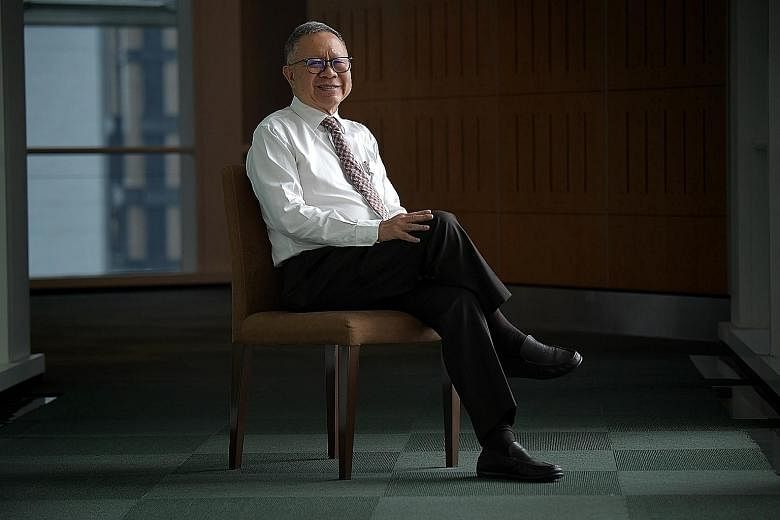When Mr Eddie Teo looks back on his 47-year public service career, it is the beginning and the end that he regards most fondly.
He started working life in the Security and Intelligence Division (SID), Singapore's hush-hush external intelligence agency. He served 24 years there, 15 of them as its director.
Since 2008, he has been chairman of the Public Service Commission (PSC), which oversees the appointment and promotion of key public servants. It also gives out government scholarships, including the prestigious President's Scholarship.
SID and PSC have given him the most satisfaction and enjoyment.
"Very different jobs," he says, "but in a way, there's one common thread between the two and that is, in the end, you're judging people, you're sizing up people.
"You're going to recruit an agent to work for Government, you size him up. You want to recruit somebody to work in the public service, you're also sizing him up."
Has passing judgment become a habit, I ask, feeling a little alarmed now at what sort of impression I've been creating on him.
He laughs: "No, no, no, no, I don't judge people all the time."
Still, I tell him, his years in intelligence - at one time, he was double-hatting as director of the Internal Security Department (ISD) - have given him something of a scary aura.
He chuckles. "That's a myth. People think I know more than I do. Actually, I don't know very much."
But he concedes he has been told he is a man of few words. It's a result of his SID background where "you don't talk too much; your role is to listen".
Earlier this month, Mr Teo, 70, was conferred the Order of Nila Utama (First Class), the highest award in this year's National Day honours.
The citation spoke of how he has set the ethos for the public service over the past decade, and credited him for his strategic input in areas ranging from intelligence and security to defence and diplomacy.
He has decided to have lunch at his PSC office at the National Library Building. I'm led to the Members' Lounge, which is empty. Two places have been set on one side of a long meeting table.
He enters the room, a trim man in shirt and tie. He has a stern, serious demeanour but is friendly. When I listen to the recording later, I am struck by how often he chuckles.
"Your problem with me is how do you make a boring bureaucratic life interesting," he says, laughing and breaking the ice.
A woman comes in and lays the table with chicken rice, char siew (roasted pork), siew yoke (roast pork belly) and a plate of cut pineapple. "Come, please help yourself," he says.
COINCIDENTALLY for a PSC chairman, Mr Teo was himself a President's Scholar.
He studied at St Andrew's School from primary to pre-university and among his classmates was Professor Kishore Mahbubani, who went on to become a diplomat and an academic. In 1967, both of them were selected for the President's Scholarship. It was the first time the school produced two such scholars in a year.
I wonder what made that happen. Good teachers? "We had one or two teachers that we liked," he says. "But I think a lot of it was we both worked very hard and we were very driven to succeed because he also came from a very humble family background. ''
Mr Teo's Peranakan father was a compradore in a Danish company here. He provided well for the family, who lived in a house in Emerald Hill Road. But when Mr Teo was eight, his father died of a heart attack. His only sibling, a sister 10 years older, found work as a typist to support him and his mother.
He reveals that they were both adopted. His adoptive mother and biological mother were in fact sisters, but he has always regarded the former as his mother.
His scholarship got him to Oxford University but he had to pass O-level Latin and a second language first, and do this in six months. He found himself a Latin tutor and memorised passages.
He decided on French for his second language because his Chinese was "almost zero" and Malay was poor. He went to the Alliance Francaise and learnt from a Vietnamese woman.
When he sat for his oral test, the examiner asked him how long he had been learning French. "I told him six months. He said, 'Six years?' 'No, no, six months.' "
He passed both exams.
Oxford was where he met his Kuching-born wife, Antonia, who was studying nursing in Britain. They got married there after he graduated. They were both 23.
He joined SID when he returned from Oxford with a degree in philosophy, politics and economics. He shares how he got that posting.
A friend had taken him to a party where a "friendly guy" went up to him and asked if he was Eddie Teo and if he was going to be interviewed soon for a job by the PSC. "I said 'yes'. He said, 'Why don't you tell them you want to join SID.' I asked, 'What's SID?' He said, 'We do research.' "
So when asked by PSC where he wanted to be posted, he said SID. "They nearly jumped out of their seats. 'How do you know SID?' " he chuckles at the memory. "So in fact I was actually recruited - in the sense that they told me about it - by SID before I went to the PSC."
Did you ever find out who the friendly guy was, I ask. "Oh ya, I worked for him after that. He was my desk head. But I will not mention his name."
He believes he was spotted because he was active in student politics in Britain and was known to be interested in current affairs.
Not very much is known about SID and I venture that it is Singapore's equivalent of a spy unit.
"We don't like to use the word 'spy'," he says. "We don't do the sort of things that some people think intelligence services do - go round assassinating people, covert action and black ops." What it does is collect intelligence and make sense of what is happening in the world.
He was very good at the work because after nine years, he was made director. He was just 31 and promoted over a few people more senior than him.
"My attitude is any job that they give me I just try my best to do what I think is necessary," he says.
"People only support you if they respect you and trust you and you prove to them that you are fair, you're impartial and you can make a contribution. When you tell people to do certain things, it must make sense to them, otherwise you'll never be a leader."
In 1982, he was told to also head the ISD, which does domestic intelligence. "They told me two years. Ended up four years. I won't wish it upon anybody else," he says. "How can I do two big jobs? It's like running FBI and CIA. Madness, you know." His main focus at ISD was to sharpen the way they did research and write reports.
After SID, he became permanent secretary at the Defence Ministry and then Prime Minister's Office. He retired in 2005 and became Singapore's High Commissioner to Australia. He was appointed PSC chairman in 2008, marking a new chapter in his public service.
EVERY year, 2,500 students apply for PSC scholarships of which 350 are shortlisted to be interviewed by a panel. He makes it a point to interview every one of them.
He enjoys how this gives him a window into how the young think about Singapore's future. He has tried to make sure recipients are selected for the right reasons, "and the right reason is not straight As. The right reason is, have you got what it takes to stay and remain committed to serving Singapore? Commitment is the root".
He acknowledges it's hard to really be sure of a teenager's sense of commitment. "Sometimes we get it wrong. We hope most of the time we get it right, and in the end with this steady stream of good people joining the public service, we will continue to have one of the best public services in the world."
The PSC keeps an open mind when selecting who to offer scholarships. "We don't have a quota system, we don't look at which school is he from, which primary school, what were his PSLE results... These don't matter. What matters is your sense of the person's ability, whether or not he will make a good civil servant."
I ask if he can tell within seconds what a person is going to be like. No, not seconds. "But the really good ones, the ones whom we are quite sure will do well, they stand out because the smarter you are, the tougher we will be."
Students who leave the interview thinking it was a breeze often aren't the ones who get the scholarships. "It's the people who sweat. The best ones get asked very difficult questions."
He has spoken before on how he places store on integrity. Can you spot integrity? "You can spot when somebody lacks something."
At interviews, there are students who wait to sense what they think the panel wants to hear . They don't pass muster. "Somebody who's brave enough to challenge, brave enough to question, brave enough to come up with something new which may or may not coincide with prevailing policy - that is somebody we think has integrity."
He recounts how a student brought along a testimonial from a minister. The panel was not impressed. "We are impartial, without fear or favour, and we don't look at whether your background is linked to so and so and you're so and so's nephew or whatever. It doesn't matter to us."
His role as PSC chairman has meant he headed the 2011 and 2017 Presidential Elections Committee (PEC), which decides who is eligible to stand for the elections.
The 2017 election was reserved for Malay candidates and the PEC declared that only former Speaker of Parliament Halimah Yacob was qualified to contest. This decision disappointed those who wanted to vote in an election. They also pointed out how, in the 2011 race, the PEC had ruled four people eligible even though two of them did not strictly meet the criteria.
To this, Mr Teo says the PEC has to operate under the Constitution. "What the Constitution lays down, we have to make sure that our decision gels with it."
In 2011, the Constitution was such that the PEC couldn't disallow people from standing because some rules were ambiguous. But constitutional changes passed last year meant that the room for discretion became smaller. "You can't go against the Constitution." The six-member PEC's decision to allow only Madam Halimah was unanimous.
On whether he expected the backlash that she got, he says: "I think we knew it was not going to be a popular decision but we had to do it. But it's for her to prove herself and to gain the respect and trust of the people, and I think she's doing a very good job and she's working very hard."
Outside of work, he has circles of friends. He is known to be a foodie and likes to try local food when he travels with his wife. They have two unmarried sons in their 40s. Paul, the older son, used to be a civil servant but now has his own investments. John is the general manager of the Peranakan Museum.
His illustrious career sounds ripe material for a book but he has no intention of writing one even if some of his peers have done so.
"The interesting things that I can write about, I cannot write; the things that I can write about are not interesting enough, so what's the point?" he chuckles. "Nobody will read my book if I write it in that way."
But they will, because even based on what he can say, his life has been anything but that of a boring bureaucrat.
Twitter @STsumikotan



